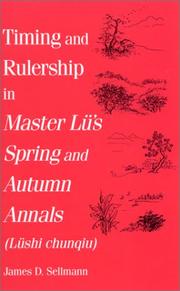| Listing 1 - 4 of 4 |
Sort by
|

ISBN: 079145231X 0791452328 0791489264 0585499675 9780585499673 9780791452318 9780791452325 9780791489260 Year: 2002 Publisher: Albany: State university of New York press,
Abstract | Keywords | Export | Availability | Bookmark
 Loading...
Loading...Choose an application
- Reference Manager
- EndNote
- RefWorks (Direct export to RefWorks)
"Master Lu's Spring and Autumn Annals (Lushi chunqiu) inspired the king who united the warring states to become China's first emperor. In this work on the Lushi chunqiu, author James Sellmann finds that the concept of "proper timing" makes the work's diverse philosophies coherent. He discusses the life and times of its author, Lu Buwei, and the structure of the work. Sellmann also analyzes the role of human nature, the justification of the state, and the significance of cosmic, historical, and personal timing in the Lushi chunqiu. An organic instrumentalist position begins to emerge from the diverse theories of the Lushi chunqiu. In conclusion, Sellmann looks at the implications of the syncretic philosophies of the Lushi chunqiu for contemporary conceptions of time, human nature, political order, and social and environmental ethics."--Jacket
Lu shi chun qiu --- Lü shi chun qiu. --- S12/0224 --- China: Philosophy and Classics--Chinese philosophy: Han --- Lü shi chun qiu. --- Lü shih chʻun chʻiu --- Ryo-shi shunjū --- Leu she chun tsew --- Lü schi tschun tsiu --- Lü lan --- Li︠u︡ĭshi chunʹt︠s︡i︠u︡ --- Lüshi Chunqiu --- 吕氏春秋 --- Chinese literature. --- Lu shi chun qiu.
Multi

ISBN: 9781785333309 Year: 2016 Publisher: New York; ; Oxford Berghahn Books
Abstract | Keywords | Export | Availability | Bookmark
 Loading...
Loading...Choose an application
- Reference Manager
- EndNote
- RefWorks (Direct export to RefWorks)
Book

ISBN: 9780824888213 0824888219 0824884620 Year: 2021 Publisher: Honolulu
Abstract | Keywords | Export | Availability | Bookmark
 Loading...
Loading...Choose an application
- Reference Manager
- EndNote
- RefWorks (Direct export to RefWorks)
In a historical moment when cross-cultural communication proves both necessary and difficult, the work of comparative philosophy is timely. Philosophical resources for building a shared future marked by vitality and collaborative meaning-making are in high demand. Taking note of the present global philosophical situation, this collection of essays critically engages the scholarship of Roger T. Ames, who for decades has had a central role in the evolution of comparative and nonwestern philosophy. With a reflective methodology that has produced creative translations of key Chinese philosophical texts, Ames—in conjunction with notable collaborators such as D.C. Lau, David Hall, and Henry Rosemont Jr.—has brought China’s philosophical traditions into constructive cross-cultural dialogue on numerous ethical and social issues that we face today. The volume opens with two parts that share overlapping concerns about interpretation and translation of nonwestern texts and traditions. Parts III and IV—“Process Cosmology” and “Epistemological Considerations”—mark the shift in comparative projects from the metaphilosophical and translational stage to the more traditionally philosophical stage. Parts V and VI—“Confucian Role Ethics” and “Classical Daoism”—might best be read as Chinese contributions to philosophical inquiry into living well or “ethics” broadly construed. Lastly, Part VII takes Amesian comparative philosophy in “Critical Social and Political Directions,” explicitly drawing out the broader dimensions of social constitution and the ideal of harmony. The contributors—scholars working in philosophy, religious studies, and Asian studies—pursue lines of inquiry opened up by the work of Roger Ames, and their chapters both clarify his ideas and push them in new directions. They survey the field of Chinese philosophy as it is taking shape in the wake of Ames’s contributions and as it carries forward a global conversation on the future of humanity.
Philosophy, Chinese --- Philosophy, Comparative --- Comparative philosophy --- Chinese philosophy --- Ames, Roger T., --- 安乐哲, --- An, Le-che, --- An-le-che, --- An, Lezhe, --- Anlezhe, --- Ames, Roger T.
Digital

ISBN: 9780824888213 Year: 2021 Publisher: Honolulu, Hawaii University of Hawaii Press
Abstract | Keywords | Export | Availability | Bookmark
 Loading...
Loading...Choose an application
- Reference Manager
- EndNote
- RefWorks (Direct export to RefWorks)
| Listing 1 - 4 of 4 |
Sort by
|

 Search
Search Feedback
Feedback About UniCat
About UniCat  Help
Help News
News